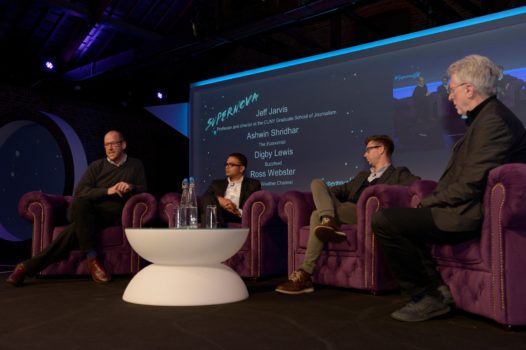The Collision of Data & Culture
by Rebecca Muir on 20th Nov 2015 in News

In October, senior thought leaders from Lloyds Banking Group, Microsoft, Dentsu Aegis, and Buzzfeed shared their wisdom with marketers at Quantcast’s annual Supernova event in London. Now in its second year, Supernova sought to explore the impact of Big Data on business, society, and the future to help publishers and advertisers use data more effectively. In this piece, Matt White, UK managing director, Quantcast (pictured, below) reflects on the day.
Supernova saw publishers, innovators, cultural figures, and media experts come together to share experiences and surface the newest opportunities for using data to propel businesses, and society, into the future. The themes of the day were: The Future of Media, Data’s Impact on Commerce and Culture, and Democratising Big Data.
The beginning of a revolution
Jag Duggal, SVP, Quantcast, remarked that we are just at the start of the data revolution, commenting that “all revolutions start slowly – they are overhyped in the beginning and underestimated in the end”. Part of the mission of the day’s speakers was also to explore how, in advertising, this data revolution is influencing the success of more and more branding initiatives, rather than solely driving direct-response campaigns.
The overhype of the power of data within the advertising industry was discussed by authors of the Long and Short of It, Les Binet, head of effectiveness at adam&eve DDB, and Peter Field, writer & consultant on marketing effectiveness. The duo explored what drives marketing effectiveness, and argued that long-term success cannot be built by a series of short-term successes. Binet concluded that it’s a combination of both approaches that’s required, with creativity being the biggest driver of returns. His advice? “Budget should be around 60% brand building and 40% activation – this is where data comes in, when we are choosing the right media for the job.”
Ed Cole, manager of marketing performance & optimisation, Lloyds Banking Group, picked up the conversation and discussed harnessing digital for both long- and short-term businesses goals. Cole remarked on the challenge of “the 30-day window in digital”, expressing the need to evaluate in both a short- and long-term capacity. Tactically, he said, “it’s about always-on activity and constant testing – 365 days, or even longer. You can then look at the impact of something like a TV burst by continued online engagement that amplifies what consumers are responding to”.
Left brain vs right brain
Microsoft’s Paul Davies, director of marketing, championed creative right brain and Leila Ratnani, group digital director of Dentsu Aegis’s Empower Media, took the mantle for the analytical left brain. Davies accused today’s marketers of binge-eating “sexy buzzwords”, and cautioned that they may be “in danger of missing the point and undervaluing the art of marketing”. However, Ratnani protested that data is about the human element too, as it enables marketers to think about delivering the right messages across devices. She conceded that “it’s an inexact science now” but concluded that “once we have all these insights, the right brain can step in and do something creative with it”.
Renowned media strategist Jeff Jarvis took the argument forward by raising the issue of drawing relevance and value from the wealth of data at our disposal. In Jarvis’s opinion, it’s clear we’re not there yet, he stated that “ad blockers give us a message: ‘enough’. We’re complicit in a crime of irritation, so we must reform advertising”. Christian Armond of TUI discussed ad blockers too, arguing that: “When it comes to ad blocking, viewability is a bigger problem. If someone has no interest in advertising there is the question of 'why would I want to advertise to them?'" Jarvis echoed this idea of interest and relevancy, cautioning that reach and frequency are a trap, but that data can make brands valuable to the right consumers; and in turn those consumers will be valuable to the brands.
Context, context, context
Buzzfeed, The Economist, and The Weather Channel shared how they are working towards delivering value to their readers. Ashwin Sridhar, global head of revenue at The Economist said it’s about a relationship, “knowing what articles they are interested in and using that information to help brands find sought-after individuals”. Digby Lewis, director of brand strategy Europe at Buzzfeed, told the audience that it’s less about a focus on personalisation for them, but “about letting people pick and choose what they want and making it available to them where they are, while taking stock of context and counting everything to see what works”.









Follow ExchangeWire